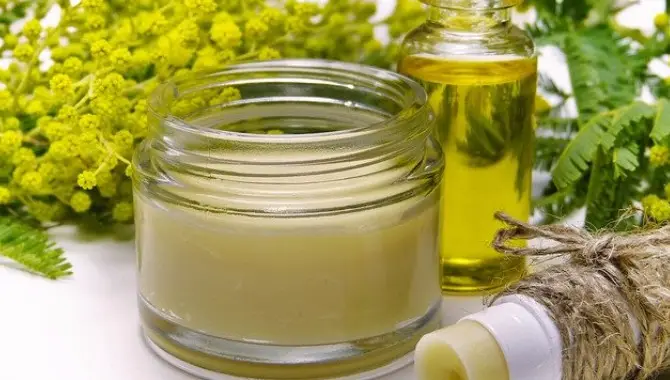Vegans practice total abstinence from animal products. In the vegan lifestyle, animals are not used as commodities. This means staying away from meat and meat products. This includes; silk, honey, gelatin, and insect products. The vegan market is on a constant rise as more people continue to understand the benefits of veganism. Shea butter is an ingredient in most cosmetic and medical applications. It is used in most skincare products. If you are a vegan who has to scan through ingredient labels, you may be wondering if shea butter is vegan. Keep reading to find the answer.
Is shea butter vegan? Yes, it is. It is made from the nuts of the Africa shea tree. Shea butter is considered vegan-friendly because it is 100% plant-based. Shea butter is completely natural and it doesn’t contain any animal products.
There is some misconception surrounding shea butter. I receive lots of questions from people who are wondering if it is vegan. Whether you are new to the vegan journey or a long-term vegan with some questions, I am happy to clear your doubts. In the article, I will explain if shea butter is vegan, its uses, safety when using it, and associated risks.
Is Shea Butter Vegan?
Shea butter is a fatty substance that is extracted from the nuts of the African shea tree. The shea tree grows in the dry savanna belt of West Africa. It grows in Nigeria, Cameroon, Ivory Coast, and other African countries. It has always been used to rejuvenate the skin and hair. When processed, it may be white or yellow.
Shea butter has some fatty acids that may also be present in animal products. Shea butter contains; Arachidic acid, Oleic acid, Stearic acid, Linolenic acid, and Palmitic acid. Most of the acids are abundant in other plant-based oil sources such as sunflowers. Because of this, there is no reason to think that shea butter is not vegan.
Stearic acid, one of the acids present in shea butter, is also present in most animal sources. This means that it can be produced from animal sources and used in skin-care products. However, stearic acid in itself is not non-vegan. If it is obtained from shea butter, it is began-friendly. Shea butter is one of the few plant sources of stearic acid.
Palmitic acid is also present in animals. However, it is also present in sunflower oils, soybean, and shea butter.
Most vegans use shea butter. The fact that it is accepted by the community means that it is vegan-friendly. Even though there are lots of questions surrounding the use of shea butter, vegans generally agree that it is acceptable.
You can use shea butter as an edible product or in skincare products. It soothes the skin, reduces irritation, and is an antioxidant. Shea butter is the main ingredient in many lotions, cosmetics, soap, lip gloss, and moisturizers. Even though shea butter is often confused with cocoa butter, they are not the same.
Shea butter has been used as a skin and hair care product in Africa for centuries. It is not processed with any preservatives or fragrances that may contain animal products. When buying your shea butter, make sure that your vendor does not test on animals. Note that shea butters are not all the same. If you want a truly vegan option, go for 100% raw or lightly refined shea butter. It should be greyish-yellow in colour. If it is pure white in colour, it may be highly processed. In its natural state, shea butter should have a faint nutty smell. The smell may start to diminish after a while.
In certain cultures, shea butter is used for cooking. In such an instance, it may not always be vegan. If, for example, you use shea butter to cook a non-vegan meal, it can no longer be considered vegan. It loses its vegan value when mixed with other oils.
What are the Benefits of Shea Butter?
- It is Safe For All Skins
Shea butter is safe for use on all skin types. It is low in proteins and does not trigger allergens.
- It Promotes Cell Regeneration
Shea butter can help your body generate new cells. The human body gets rid of up to 40,000 old skin cells every day. Shea butter moisturizes the skin and ensures that you have few dead skin cells and lots of new cells.
- It is Anti-Inflammatory
Shea butter is anti-inflammatory. It triggers inflammatory cells to slow down their production. It protects the skin from harsh environmental factors and skin conditions.
- It Soothes Certain Skin Conditions
Shea butter may soothe skin conditions such as eczema and psoriasis. It relieves itching and keeps your skin healthy. It offers quick relief since it is quickly absorbed into the skin.
- It is an Antioxidant
Shea butter is rich in vitamins A and E which makes it a rich antioxidant. It protects your skin from free radicals and prevents premature ageing.
- It Soothes Insect Bites
If you have an insect bite or bee sting, applying some shea butter can give you relief. It may prevent swelling and reduce the severity of pain. Consider using shea butter for partial relief while you seek medical help.
- It is Antibacterial
Shea butter is said to have antibacterial properties. It may be a great way to deal with acne-causing bacteria.
- Skin Smoothing
If you wish to get clear and smooth skin, consider using shea butter. It promotes the production of collagen to keep your skin looking good. It also has linolenic and stearic acids that nourish your skin and keep it moisturized. Regular use of shea butter can control wrinkling and keep your skin smooth.
Safety When Using Shea Butter
Shea butter is safe for use for both children and adults. It is edible and safe for application on the skin. If you are using it to treat irritated skin or insect bites, it is best used short-term. If you still need medical attention, seek the help of a doctor.
It is safe for use when pregnant or breast-feeding. If you choose to ingest it, keep it moderate. There is no evidence to support the use of shea butter in amounts that are greater than what is found in foods.
One of my favourite things about shea butter is that it is safe for both children and adults.
Shea butter allergy is very rare. Reports by the American College of Allergy, Asthma, and Immunology suggest that tree nuts are a common cause of allergies. Some of the most common symptoms of nut allergies include;
- Nausea
- Difficulty swallowing
- Itchiness
- Difficulty breathing
However, shea butter allergies are very rare. The nuts have a very small amount of proteins. It is not enough to trigger allergies. Even though shea butter can trigger allergic reactions for people with tree nut allergies, none have been reported. It is safe to assume that shea butter is safe.
Note that you may be allergic to certain colouring agents or preservatives used to make your shea butter product. To be safe, avoid using low-quality shea butter that may not have been tested for safety.
People with latex allergies may be sensitive to shea butter as it contains a latex-type compound. Prolonged use of shea butter may be unsafe for acne-prone skin. Studies by the American Academy of Dermatology revealed that shea butter can clog skin pores.
Is Shea Butter All the Same?
Shea butter is not all the same. New shea butter is a lot more beneficial than that which has been on the shelf for a long time. To reap maximum results, use freshly extracted shea butter. Certain refining techniques may lower the quality of your shea butter. If it has been highly processed, it is unlikely to have the same benefits.
Some refiners add lots of ingredients to very little shea butter causing it to lose its effectiveness. Before using shea butter, read the ingredients and find out how many other chemicals have been added. On the label, ingredients are written in order from the most to the least. If a product has very little amounts of shea butter, you are unlikely to reap the full benefits of shea butter. Beware of shea butter that is sold at very low prices.
Raw shea butter is different from refined shea butter. The difference is in the way that it is extracted from the nut and refined. If it is manually extracted, it is likely to retain most of its raw ingredients. Some people prefer to further refine it to get rid of impurities. Further refining may lead to the loss of certain ingredients. If chemicals are used, shea butter may lose its smell and healing potential. If your goal is to enjoy the maximum benefits, raw shea butter is a lot better than refined shea butter. It is more natural and it still has its healing properties. The only challenge of using raw shea butter is that it has a rather strong odour. Processing helps to get rid of it.
Shea butter is resilient. It can remain on the shelf for up to four years. However, there are a few instances when it may go bad prematurely. They include;
· Exposure to light and heat may result in natural oxidation. It changes the chemical structure of your shea butter causing it to go bad.
· If shea butter does not contain any preservatives, exposure to water may contaminate it. It may result to the growth of yeast and mold.
The spoiled butter has an unpleasant acidic smell and isn’t suitable for use on the skin. Keep your shea butter in a cool, dry place. You may store it in a glass jar or its original packaging.
Shea butter is recognized for its healing and moisturizing qualities. It keeps the skin healthy and treats various skin conditions. The butter is used in various cosmetic products. It is appropriate for both vegans and non-vegans.
Welcome to VeganClue - My name is Robert Van De Ville and together with my team we spent hundreds of hours researching the most relevant topics for Vegans and non yet Vegans. Are you looking for more information about Veganism, animal welfare, diet, health, and environmental benefits of the Vegan lifestyle? You are in the right place! Enjoy the site.

